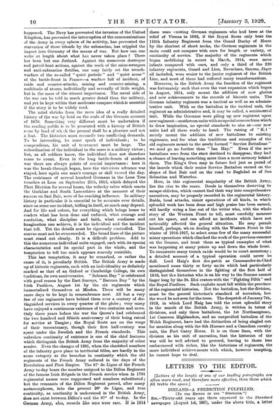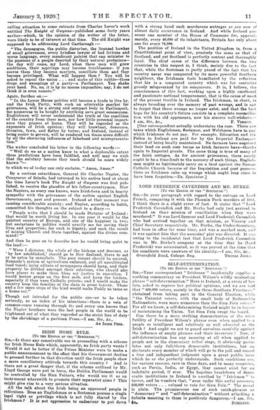LETTERS TO THE EDITOR.
[Letters of the length of one of our leading paragraphs are often more read, and therefore more effective, than those which fill treble the space.] IRELAND—A PREDICTION FULFILLED. [To me Berme Or UTE " Snernon."] Sue—Thirty-odd years ago there appeared in the Standard newspaper (August 1st, 1887), under the above title, a letter calling attention to some extracts from Charles Lever's work entitled The Knight of Gwynne—published some forty years earlier—which, in the opinion of the writer of the letter, were likely to be of interest at that time. The old Knight was simpered to be addressing Lord Castlereagh :-- "The demagogue, the public disturber, the licensed hawker of small grievances, every briefless lawyer of bad fortune and worse language, every mendicant patriot that can minister to the passions of a people deserted by their natural protectors— the day will come, my Lord, when these men will grow ambitious, their aspirings may become troublesome: if you coerce them they become martyrs, conciliate them and they become privileged. What will happen then P You will be asked to repeal the union . . . and make of this rabble—these dregs and sweepings of a party—a Parliament. You shake your head. No, no, it is by no means impossible; nay, I do not think it is even remote."
Again, further on:— " In the Lower House polities will become a trade to live by, and the Irish Party, with such an admirable market for grievances, will be a strong and compact body in Parliament, too numerous to be bought by anything save great concessions. Englishmen will never understand the truth of the condition of the country from these men, nor how little personal import- ance they possess at home. They will be regarded as the exponents of Irish opinion; they will browbeat, denounce, threaten, fawn, and flatter by turns; and Ireland, instead of being easier to govern, will be rendered ten times more difficult by all the obscuring influences of falsehood and misrepresenta- tion."
The writer concluded his letter in the following words :-
" Well do we as a nation know to what a deplorable extent these predictions have been fulfilled, and well may we wish • that the salutary lessons they teach should be more widely known "— to which we of to-day can only exclaim, " Amen, Amen."
By a curious coincidence, General Sir Charles Napier, the Conqueror of Scinde, had returned to his native land at abort the time Lever's book The Knight of Gwynne was first pub- lished, to receive the plaudits of his fellow-countrymen. Now the Napiers, as every one knows, were Irish-born and in hearty sympathy with the grievances of the nation against English Governments, past and present. Ireland at that moment was causing considerable anxiety; and Napier, according to habit, committed his thoughts on the subject to a diary :—
" People write that I should be made Dictator of Ireland: that would be worth living for. In one year it would be the quietest country of Europe, and one of the happiest in two; but sectarians in politics would crucify me for saving their lives and properties; for such is bigotry, and such the result of mixing Church and State together, against the divine com- mand!"
And then he goes on to describe how he would. bring quiet to the land:— "Were I dictator, the whole of the bishops and deacons, as ' by law established,' should go to New Zealand, there to eat or be eaten by cannibals. The poor tenant should be secured, Kennedy's system of agriculture enforced, and all unoultivated land taxed; noisy editors of newspapers should hang, and their property be divided amongst their relations, who should also have places to make them bless my justice in execution. I would bestow grape on the first mob, and hang the leaders, especially if they were Catholic priests; and I would make the country keep the families of the slain in great luxury. These , and a few more steps of the kind would make Paddy as tame as k a house cat."
Though not intended for the public eye—or to be taken seriously, as an index of his intentions—there is a vein of common-sense running through it; and every one knows that the Napier brothers were the last people in the world to be frightened out of what they regarded as the strict line of duty' by the shriekings of a partisan Press.—I am, Sir, &c., An Lusa Pam.











































 Previous page
Previous page